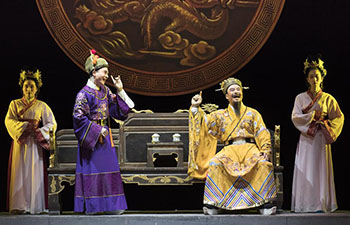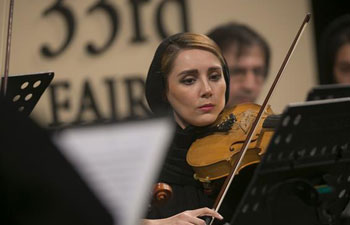by Julia Pierrepont III
LOS ANGELES, Jan. 15 (Xinhua) -- Set in colorful, mid-1800's New York City, Hugh Jackman's hit musical "The Greatest Showman" is hitting all the high notes, pulling in 94.5 million U.S. dollars in North America and more than 100 million dollars internationally, through Sunday.
"The Greatest Showman" is inspired by the story of P. T. Barnum's creation of the Barnum & Bailey Circus and the lives of its star attractions. Directed by Michael Gracey in his directorial debut, the film stars Hugh Jackman as P. T. Barnum, an ambitious American showman and entrepreneur.
5.5 out of every 10 critics on Rotten Tomatoes gave it a positive rating, while 9 out of 10 audience members gave it an enthusiastic thumbs up.
Hugh Jackman told Xinhua, "I'm so proud of it! When you tell an actor like me that his song from the movie is also topping the music charts, I can't help bragging about that!"
First time film director Michael Gracey delivered a colorful, creatively staged and emotionally resonant crowd-pleaser, with high-caliber help from 2-time Oscar nominated cinematographer Seamus McGarvy, 3-time Oscar nominated production designer Nathan Crowley, and visionary talent Hugh Jackman himself.
The songs and score, by Academy Award-winning composing team, Benj Pasek and Justin Paul of "La La Land" fame, and talented choreographer Ashley Wallen, popped out a series of rhythmic, toe-tapping show-stoppers worthy of Oscar norms, which Urban Cinefile called, "a sizzling explosion of colour, music and joie de vivre..."
As a creative team, they brought the house down, creating a magical, uplifting musical extravaganza that's a cinematic feast for the eyes, ears and hearts.
Variety reported that, "it takes the life of P.T. Barnum, the anything-goes circus impresario of the 1800s, played with irresistible effervescence by Hugh Jackman, and turns him into a saintly huckster-maestro who invented the spirit of modern showbiz by daring to follow his dream... It's a biopic that forges its own uplifting mythology, and if you think back on it when it's over and feel, maybe just a little bit, like you've been had - well, that's part of its sleight-of-hand charm."
Jackman told Xinhua, "this was my passion project. I knew in my gut it was a story I wanted to tell and, though it took years to get off the ground, it was all worth it in the end."
While keeping the tone light, the film manages to convey a powerful message about diversity and acceptance, including the inspiring, tear-jerker theme song. "This is Me", destined to become an anthem for anyone anywhere who's ever felt on the outside looking in.
The film revolves around Barnum's early days when he created what we think of as the modern circus. But it took homegrown Barnum to conceive of combining equestrian acts, trained animals, menageries, goofy clowns, human feats of strength and agility with human oddities and curios all under one show-stopping, jaw-dropping Big-Top Circus.
Barnum rose to wealth and fame with his unparalleled gift for what the Irish affectionately call "blarney," elevating showmanship to an art form, and making him the most famous American in the world.
Jennifer Tucker, Associate Professor at Wesleyan University, wrote in the Hartford Courant that "Barnum deliberately created controversy: by producing a fake mermaid, for example - and then leaving it up to the public to judge the facts."
There is some controversy that the film, in typical Hollywood revisionist fashion, unabashedly celebrates Barnum as a courageous humanist and hero for daring to embrace society's human "oddities" and misfits.
But as LA Times film critic Justin Chang puts it, "curiously absent from the movie's relentless feel-good offensive are any references to, say, ... Joice Heth, a slave whom Barnum paraded before his customers, falsely claiming that she was George Washington's 161-year-old former 'mammy'."
Yet others contend that Barnum's lapses were offset by his vigorous, pre-Civil War anti-slavery stance and his frequent staging of abolitionist performances, such as Harriet Beecher Stowe's iconic "Uncle Tom's Cabin," in which Barnum gave the story a revised happy ending, freeing Tom and other slaves.
Also, when an elected member of the Connecticut legislature with strong religious convictions, Barnum went out on a limb to eloquently support the ratification of the US 13th Amendment (abolishing slavery).
Variety's critic Owen Gleiberman said, "the crowd will have a chance to behold the humanity of his freaks - and that's true... 'The Greatest Showman' turns Barnum, for all his carny capitalism, into the multiculti Mother Teresa of oddball showmanship. He really believes he's doing it for their own good, and so does the movie."
In many ways, "The Greatest Showman" is an apt allegory and necessary patent medicine for a time when racism is openly espoused in the United States, and some ethnicities are currently under fire.

















